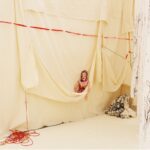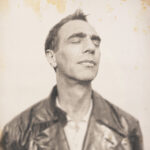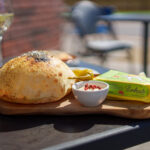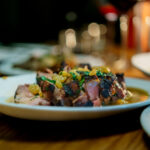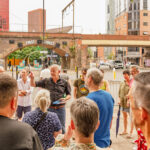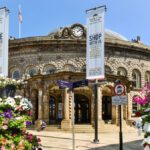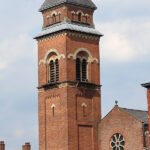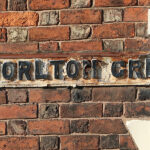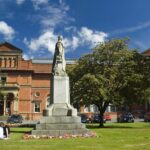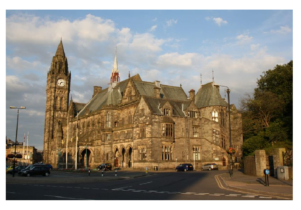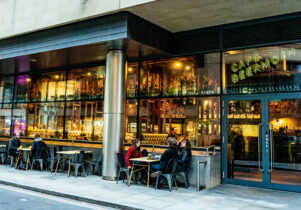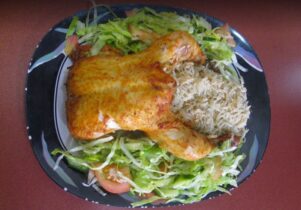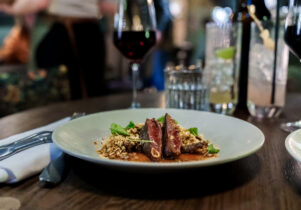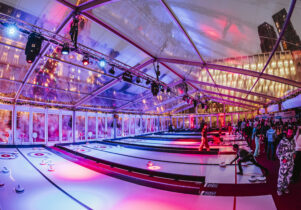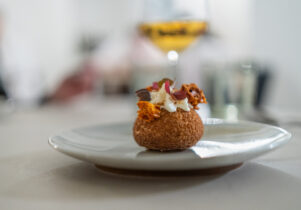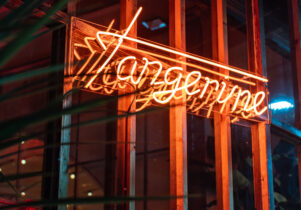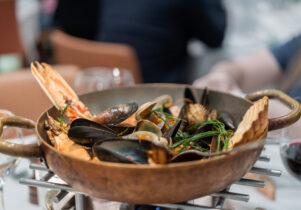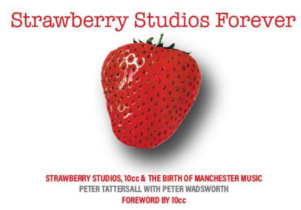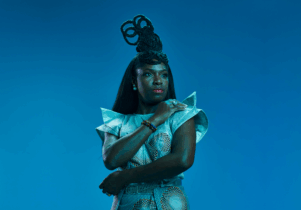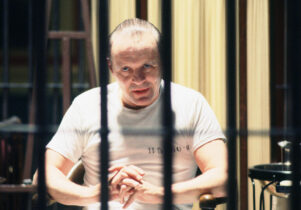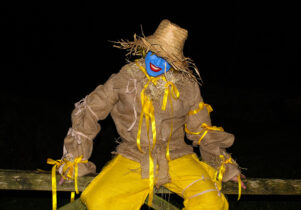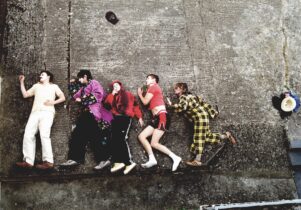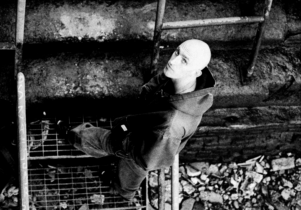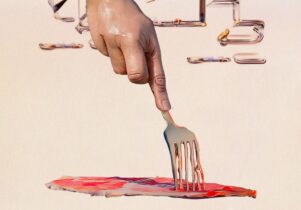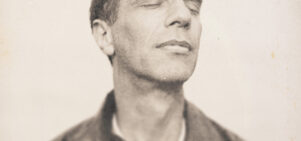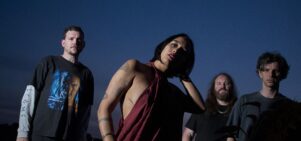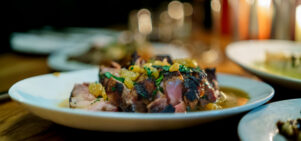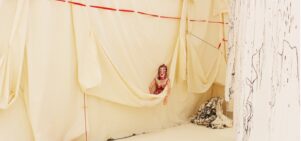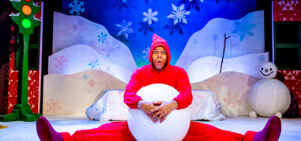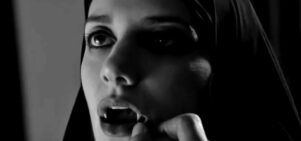Psappha: Winter Reels at St Michael’s
Johnny James, Managing EditorBook now
Winter Reels
Always double check opening hours with the venue before making a special visit.
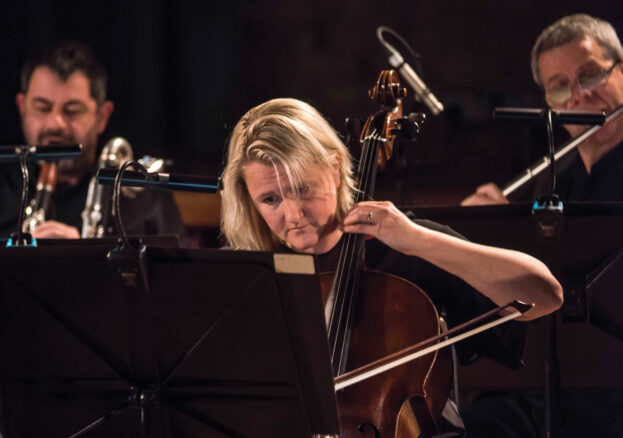
Looking ahead to what’s on at St Michael’s over the winter months, contemporary classical ensemble Psappha have some particularly exciting concerts coming up. Before March’s Starry Night, February holds Winter Reels, a concert filled with much-admired music by John Casken, Knut Vaage and Naomi Pinnock as well as a brand new work by Stephen Pratt.
No stranger to Psappha, John Casken’s Winter Reels was commissioned by the ensemble back in 2010. At once toughly made and expressively generous, it captures the wintry landscape of northern England, where Casken was born. Consisting of three movements, the work opens with ‘a warming dance’ whose powerful chords slowly give way to lilting triplet rhythms. Given mostly to the cello, the second movement is ‘a cold song’ which takes place largely in the treble register and often features metallic resonances from the percussionist. Finally, ‘a spirited gathering’ is set off by irresistible drum rhythms that rapidly encourage the instruments to dance together again. This should be a real treat.
Joining Casken in the programme is Norwegian composer Knut Vaage, whose music often investigates the boundaries between improvisation and composition. His 1998 work Jug Band Rag, which we’ll hear in this concert, extends the jazz-inspired neo-classicism of Hindermith, suggesting the made-instruments of primitive bands. A very witty piece, it will make a good contrast for the next work in the programme, West Yorkshire-born Naomi Pinnock’s Music For Europe, which is an intense and enigmatic lament. Premiered at the Huddersfield Contemporary Music Festival back in 2016, the composer’s piece was inspired by a Paul Klee text-painting which she happened to see the day after the Brexit vote. Its simple, fragile beauty reflects both the text-painting and the fractured times that we live in.
Completing the programme is a brand new Psappha commission by Liverpool-based composer, conductor and broadcaster, Stephen Pratt. The wonderful story of the piece is told best in the composer’s own words:
“Around the time that I began work on this piece, my good friend and fellow-composer James Wishart died after a long period of ill-health. James’ poignant work ‘The Leaving of Liverpool’ had been performed and broadcast by Psappha a year or so before he died, so it was doubly appropriate that the new piece for this ensemble should be ‘about’ James in some way.
Keen to avoid an overly elegiac approach, I decided to build it around a memory of an incident that occurred when James and I and some of our composition students attended the 1984 Musica Nova festival in Glasgow. After a long day attending concerts and workshops, James was insistent that we should all attend a late night concert of Danish new music, and (despite the attractive option of the festival bar and the local fish and chip shop) we duly obliged. One of the featured pieces in the programme, ‘Plateau pour Deux’ by Pelle Gudmundsen-Holmgreen, was scored for solo cello and percussion – and the latter included a prominent role for two car horns.
A somewhat bewildered audience listened attentively to the first section of this piece, in which the cello held long notes, quietly, whilst the two car horns were deployed in a strident and rhythmic fashion. I became aware that our row of seats was beginning to shake – James had the giggles, and was trying to contain himself. A pause between movements offered the opportunity for him to take control, but when the piece restarted in a very similar fashion, he could hold it no longer and there was a loud explosive laugh from his direction. He was not alone – as the piece progressed, many members of the audience joined him, with many clearly unsure whether it was OK to laugh at a new music event. James, however, was past caring. The situation was not eased by the fact that the concert was being recorded by the BBC. By some of James’ later reactions to certain pieces in the concert hall this was a somewhat benign response, but the incident stuck – affectionately – in the memory. I told the story at his funeral.
I had been exploring various ways of incorporating this episode into my new piece when I came across ‘Exercises in Style’, by Raymond Queneau. This brilliant book takes a simple, short tale and re-tells it 99 times in a virtuosic display of literary technique and imagination. The English translation by Barbara Wright (from the original French) is masterly, in many ways another ‘retelling’. So, I had a model. The new piece would recall the event, and then ‘re-tell’ it in different ways. As the piece progresses, the focus slips away from the original event to become a lens to other pertinent memories. That said, the basic components of the tale are never far from the surface.”
We very much look forward to hearing Pratt’s new work, as well as the wonderful music of Casken, Pinnock and Vaage. As with Starry Night, Winter Reel‘s exciting programme will be preceded by a free pre-concert talk, wherein we will gain an insight into the composers and learn more about their pieces prior to hearing them played. A wonderful idea!

